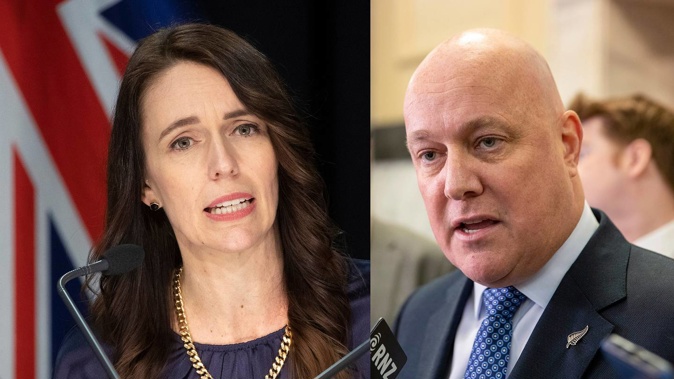
National and Act would take power from Labour at next year’s election based on the latest political poll.
Labour has dropped to 32.3 per cent - a fall of 5.9 per cent - in tonight’s Newshub-Reid Research poll, while National is steady at 40.7 per cent.
This is Labour’s lowest result since Ardern became leader of the party in 2017.
Act is at 10 per cent, while the Green Party is at 9.5 per cent.
National and Act collectively are on 50.7 per cent, meaning they could take power together in next year’s election.
The same cannot be said for Labour and the Greens, who together are on 41.8 per cent.
The support for New Zealand First has increased by 1.6 points to 3.3 per cent, edging Winston Peters closer to being back in Parliament.
Te Pāti Māori has dropped back to 1.9 per cent, down 0.6 points, and The Opportunities Party is up 0.3 points on 1.2 per cent.
‘Labour has come back from far worse’ - Ardern reacts
Labour has come off far worse polling results to win an election, Prime Minister Jacinda Ardern told Newshub this morning.
Ardern said Labour Party has had regular polling that showed Labour and National were neck-and-neck.
“I don’t govern by polls, I govern by people, I govern by what I see as the needs for our people,” Ardern said.
Labour’s polls showing the two major parties neck and neck were a “fairly accurate representation” of the situation right now, she said.
“We’re roughly a year out from an election, Labour has come back from positions far worse than this to win an election,” Ardern said.
“And because we have focussed on our people.”
When asked what her main focus were heading to an election year, Ardern said it was “doing what is right for our people in this moment in time”.
“We’re in a global economic crisis, the focus has to be about what we are doing for our people.”
Preferred PM - Ardern’s popularity slides
Jacinda Ardern fell to 29.9 per cent as preferred prime minister, a 6.9 per cent drop from the last poll.
Christopher Luxon also fell, with 21.5 per cent preferring him as prime minister, a 2.4 per cent drop.
David Seymour was the biggest winner in the preferred prime minister poll, up 2.2 per cent to 7.3 per cent.
Chloe Swarbrick also rose by 1.1 per cent on the same measure, with 2.4 per cent preferring her as prime minister, despite the Auckland Central MP not leading the Greens.
Tonight’s poll came only hours after Ardern announced a substantial $189 million boost to the Government’s childcare subsidies scheme at the Labour Party conference in South Auckland.
The changes, which will see more than half of families qualify for subsidies on their children’s pre and after-school care, are to ease the cost-of-living pressure on families on low to middle incomes.
Ardern also announced increases to Working for Families tax credits from April next year, after they are adjusted for inflation. - increases expected to cost about $26m.
Labour’s deputy leader Grant Robertson used the conference to take a series of pot shots at the National Party and its leader Christopher Luxon, a move he said was intended to spell out what was “at stake” in the next election.
/cloudfront-ap-southeast-2.images.arcpublishing.com/nzme/THI43KRNPZGXXC5ISZKRJSNWR4.jpg) Grant Robertson speaks at Labour Party conference. Photo / Jed Bradley
Grant Robertson speaks at Labour Party conference. Photo / Jed Bradley
He later denied his frequent reference to the National leader meant he was worried about the threat Luxon posed at the ballot boxes.
Labour is struggling in the polls after its landslide 2020 result and is under pressure to help address high inflation and rising interest rates.
Last month’s Taxpayers’ Union-Curia Poll showed National and Act could govern alone, but it also saw a slight uptick in support for Labour.
That poll had National increasing its support by two points from September to 39 per cent. Labour was up one point to 34 per cent, the Greens were down three points to 7 per cent and Act dropped three points to 9 per cent.
This gave the traditional right-leaning coalition partners 49 per cent (with rounding), adding up to 63 of the 120 seats in the House - enough to form a government.
Take your Radio, Podcasts and Music with you









